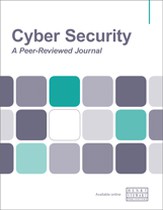The role of information about opponent’s actions and intrusion-detection alerts on cyber decisions in cyber security games
Abstract
Cyberspace is becoming increasingly prone to cyberattacks. Cyberattack and cyber-defend decisions may be influenced by the information about actions of adversaries and defenders available to opponents (interdependence information) as well as by alerts from intrusion detection systems (IDSs), which offer recommendations to defenders against cyberattacks. Little is currently known, however, on how interdependence information and IDS alerts would influence the attack-and-defend decisions in cyber security. This paper discusses a laboratory experiment involving participants (N = 140) performing as would-be adversaries (attackers) and defenders (analysts). Participants were randomly assigned to four between-subjects conditions in a cyber security game, where the conditions varied in interdependence information (full-information or no-information) and IDS alerts (present or absent). Results revealed that the proportion of defend (attack) actions were smaller (same) when IDS was present compared to absent. In addition, the proportion of defend (attack) actions were same (smaller) in conditions of full-information about opponents compared to no-information about opponents. Furthermore, to understand the experimental results, the authors calibrated cognitive models based upon instance-based learning theory (IBLT), a theory of decisions from experience. Based upon the experimental conditions, four different variants of a single instance-based learning (IBL) model were developed. Model results revealed excessive reliance on recency and frequency of information and cognitive noise among both attackers and defenders across different experimental conditions. The paper highlights the implications of our results for cyber-decisions in the real world.
The full article is available to subscribers to the journal.
Author's Biography
Palvi Aggarwal is a post-doctoral fellow at the Dynamic Decision Making Lab, Carnegie Mellon University, Pittsburgh. She received her PhD in computer science from Indian Institute of Technology Mandi, India. She received her master’s degree in Information security from Thapar University Patiala, India. Her current research areas include cyber security, cognitive modelling and machine learning.
Varun Dutt received his PhD from Carnegie Mellon University in 2011. He is an associate professor and principal investigator at the Applied Cognitive Science Laboratory, School of Computing and Electrical Engineering, Indian Institute of Technology Mandi. Varun is also the review editor of Frontiers in Cognitive Science and Frontiers in Decision Neuroscience journals. His current research interests include cyber security, cognitive science, judgment and decision making, and artificial intelligence.
